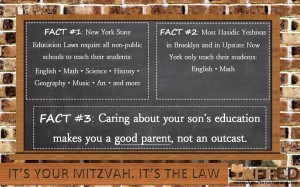Eyes on Jewish Education, Beyond East Ramapo — Why We Need More than Oversight as Schools Under Hasidic Control Fail NY Children
When Cosmos debuted, my husband was in awe. He had taken a biology course as an undergraduate, but that had been his first and only encounter with science. Newton, physics, history of science, evolution — none of those had existed for him before the age of 21. He had attended Belz Yeshiva — first in Brooklyn’s Borough Park, then in Israel.
At Belz, most secular subjects were and continue to be neglected. Like so many men who attend Hasidic yeshivas for elementary and high school, my husband got a heavy dose of Chassidus, some Chumash, Talmud and Halacha (Jewish law). He learned how to comport himself, how to dress and pray. He could tell you the quantity of food requiring an after-blessing and the things you cannot sort on the Sabbath. But he could not have told you any of these things in English. Yiddish was the spoken language at home and in school. Even non-Judaic subjects were taught by community members who often struggled with grade-school English.
As executive director of YAFFED: Young Advocates for Fair Education, I’ve had the privilege of meeting ambitious young men who overcame the obstacles born of an inferior education, and I’ve collected stories along the way. There was the English teacher from New Square who would call up his less religious brother-in-law before class to learn how to pronounce the vocabulary words he’d be teaching his third-graders. This teacher was asked to leave when the school began to worry that he was too knowledgeable and that he might have a negative influence on the students. I’ve heard of innocuous children’s books confiscated because they were written in English and a lack of classroom decorum during the last hour of the school day, when general studies are taught, fostering an abusive environment for teachers and a poor learning environment for students.
The State of Hasidic Education
The current state of Hasidic education makes the situation in Rockland County, New York, particularly disturbing. Hasidim gained majority control of the local school board in 2005. Since then the school board has withdrawn funds from schools that do abide by education laws to fund instead schools that don’t bother, cutting public school courses, laying off teachers, and attempting to sell public school property for less than half the market value. While utter disregard for general education is common in Hasidic communities, it is less common for the Hasidic community to wield enough power to manipulate funds and affect neighboring schools to this degree. Aside from the dubious legality of these actions, the ramifications are significant, spurring public outrage and potentially inviting anti-Semitism.
The Rockland Clergy for Social Justice and Uri L’Tzedek have been taking action, making the case in Albany, and now organizing the Jewish community and allies to call state lawmakers in support of public oversight. The Education department has finally also gotten involved.
A Larger Underlying Problem
What we need, however, is far more than mere oversight of government funds. We should not need to wait for misguided education standards to take a toll on neighbors, or for the abuse of funds to become flagrant.
The underlying problem is larger and more concerning. There are far too many Hasidic communities — in Borough Park, Williamsburg, Crown Heights, and upstate New York — that are not infringing on public schools or their non-Jewish neighbors in such overt ways. Yet these Hasidic communities are doing a tremendous disservice to their own children by failing to provide a basic education. At YAFFED we’re working to address this gross neglect of general education in yeshivas. (Ironically, girls in these same communities are offered a basic education that includes English, math, some science and history, among other things.)
While it is encouraging to see the Department of Education finally getting involved in East Ramapo, even now its involvement likely will not extend to yeshivas but only to public schools. The DoE has been complicit for too long under the guise of freedom and religion-state separation. “It’s complicated,” DoE officials in Albany and Brooklyn keep stating, fearful of overstepping boundaries and the resultant repercussions. To me, this seems extremely uncomplicated. The DoE is responsible for the educational welfare of children.
With all the media attention in East Ramapo, many voices are joining together to champion decent standards for education and to decry the current state of affairs. At the same time, we need more Jewish voices to stand up for our educational values and to speak for students in yeshivas and in public schools.
Miriam Moster is the executive director of YAFFED: Young Advocates for Fair Education, which works to improve general education curricula in ultra-Orthodox schools. She is also a writer and expects to receive her MFA in June from Hunter College, where she currently teaches creative writing.
Three Things You Can Do Right Now!
• Keep up with new YAFFED initiatives on Facebook.
• Sign the Uri L’Tzedek petition.
• Let NY state representatives know that you stand with Rockland Clergy for Social Justice and thank them for supporting New York State children, Assemblywoman Jaffe, Assemblyman Zebrowski and Senator Carlucci.
![[the current issue of ZEEK]](../../image/2/100/0/5/uploads/leftistethicistgraphic-52842c6a.png)
- 5000 Pages of Zeek
- Founded in 2001, Zeek was the first Jewish online magazine, and we have over 5000 pages online to prove it, all available free of charge. Read more in the Archive.
More articles by
Miriam Moster
More articles in



